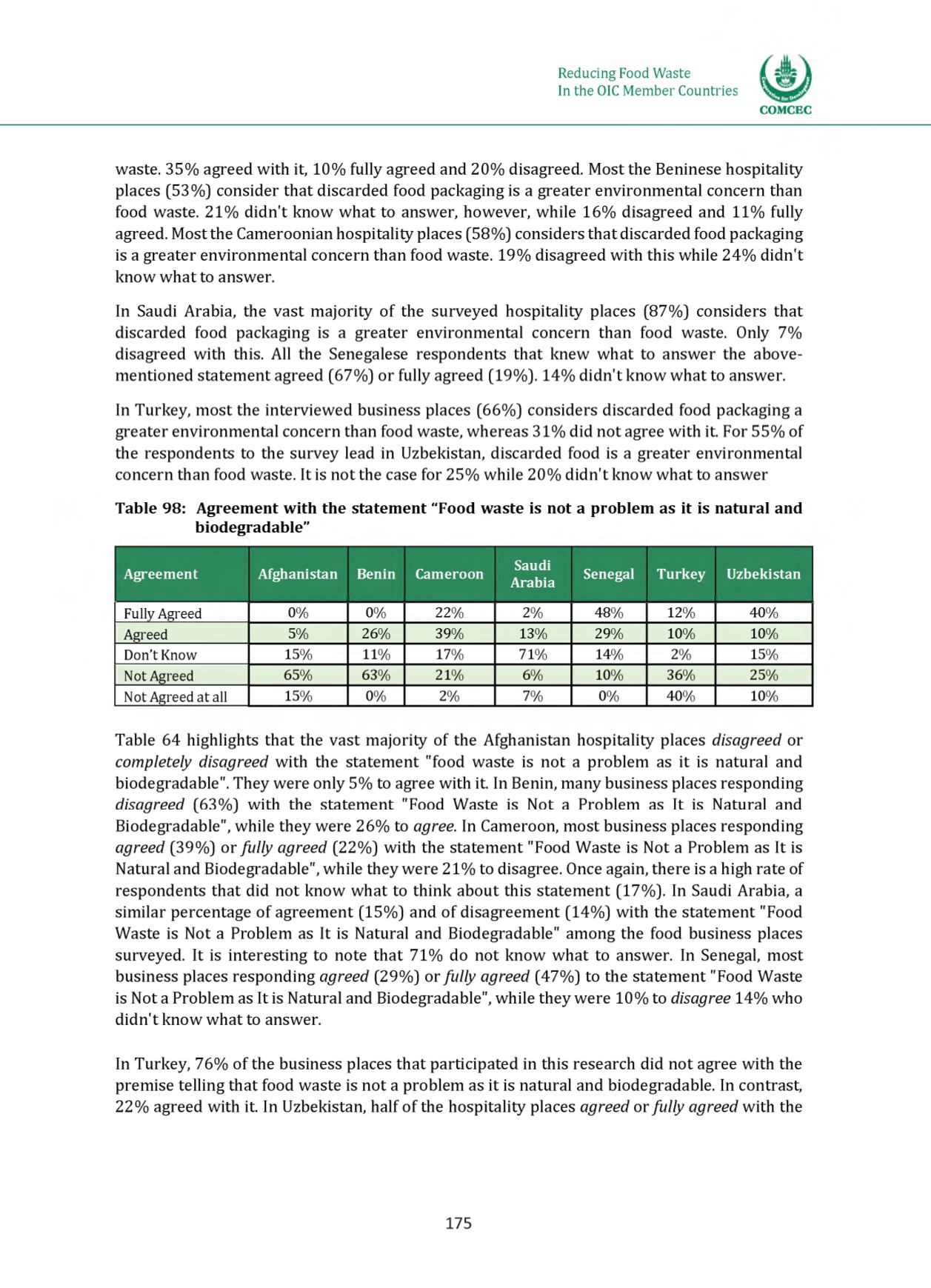

COMCEC
Reducing Food Waste
In the OIC Member Countries
waste. 35% agreed w ith it, 10% fully agreed and 20% disagreed. Most the Beninese hospitality
places (53% ) consider tha t discarded food packaging is a greater environmental concern than
food waste. 21% d id n 't know w h a t to answer, however, while 16% disagreed and 11% fully
agreed. Most the Cameroonian hospitality places (58% ) considers th a t discarded food packaging
is a greater environmental concern than food waste. 19% disagreed w ith this while 24% d id n 't
know w h a t to answer.
In Saudi Arabia, the vast m ajority o f the surveyed hospitality places (87% ) considers tha t
discarded food packaging is a greater environmental concern than food waste. Only 7%
disagreed w ith this. All the Senegalese respondents tha t knew w h a t to answer the above
m entioned statement agreed (67% ) or fully agreed (19% ). 14% d id n 't know w h a t to answer.
In Turkey, m o st the interviewed business places (66% ) considers discarded food packaging a
greater environmental concern than food waste, whereas 31% d id n o t agree w ith it. For 55% of
the respondents to the survey lead in Uzbekistan, discarded food is a greater environmental
concern than food waste. It is n o t the case for 25% while 20% d id n 't know w h a t to answer
Table 98: Agreement with the statement "Food waste is not a problem as it is natural and
biodegradable”
Agreement
Afghanistan Benin Cameroon Saudi
Arabia Senegal
Turkey Uzbekistan
Fully Agreed
0%
0% 22%
2% 48% 12% 40%
Agreed
5% 26% 39%
13% 29% 10%
10%
Don’t Know
15% 11% 17%
71% 14% 2%
15%
Not Agreed
65% 63% 21%
6% 10% 36%
25%
Not Agreed at all
15% 0% 2%
7%
0% 40%
10%
Table 64 highlights tha t the vast majority of the A fghanistan hospitality places
disagreed
or
completely disagreed
w ith the statement "food waste is n o t a p rob lem as it is natu ral and
biodegradable". They were only 5% to agree w ith it. In Benin, m any business places responding
disagreed
(63% ) w ith the statement "Food Waste is Not a Problem as It is Natural and
Biodegradable", while they were 26% to
agree.
In Cameroon, m ost business places responding
agreed
(39% ) or
fully agreed
(22% ) w ith the statement "Food Waste is Not a Problem as It is
Natural and Biodegradable", while they were 21% to disagree. Once again, there is a high rate of
respondents tha t did no t know w h a t to th ink abou t this statement (17% ). In Saudi Arabia, a
sim ilar percentage o f agreement (15% ) and o f disagreement (14% ) w ith the statement "Food
Waste is Not a Problem as It is Natural and B iodegradable" among the food business places
surveyed. It is interesting to note tha t 71% do no t know w h a t to answer. In Senegal, most
business places responding
agreed
(29% ) or
fully agreed
(47% ) to the statement "Food Waste
is Not a Problem as It is Natural and Biodegradable", while they were 10% to
disagree
14% who
d id n 't know w h a t to answer.
In Turkey, 76% o f the business places tha t participated in this research did n o t agree w ith the
prem ise telling tha t food waste is no t a prob lem as it is natu ral and biodegradable. In contrast,
22% agreed w ith it. In Uzbekistan, ha lf o f the hospitality places
agreed
or
fully agreed
w ith the
175
















